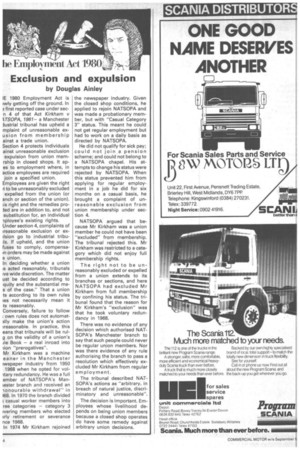he Emplo),ment Act 1980
Page 26

If you've noticed an error in this article please click here to report it so we can fix it.
Exclusion and expulsion
by Douglas Ainley
IE 1980 Employment Act is iwly getting off the ground. In a first reported case under secn 4 of that Act Kirkham v 1TSOPA, 1981— a Manchester lustrial tribunal has upheld a mplaint of unreasonable exusion from membership ainst a trade union.
Section 4 protects individuals ainst unreasonable exclusion expulsion from union memrship in closed shops. It apes to employment where, in actice employees are required join a specified union.
Employees are given the right it to be unreasonably excluded expelled from the union (or anch or section of the union). is right and the remedies proled are in addition to, and not substitution for, an individual iployee's existing rights.
Under section 4, complaints of 'reasonable exclusion or exilsion go to industrial tribuIs. If upheld, and the union fuses to comply, compensain orders may be made against e union.
In deciding whether a union is acted reasonably, tribunals 'ye wide discretion. The matter ust be decided according to quity and the substantial mes of the case." That a union ts according to its own rules ies not necessarily mean it ts reasonably.
Conversely, failure to follow , own rules does not automatally make the union's action treasonable. In practice, this eans that tribunals will be rulg on the validity of a union's _Ile Book — a real inroad into lion "prerogatives".
Mr Kirkham was a machine eaner in the Manchester iwspaper industry from 1950 1968 when he opted for volitary redundancy. He was a full ember of NATSOPA's Man'ester branch and received an onourable withdrawal" in 168.1n 1970 the branch divided casual worker members into ree categories — category 3 ivering members who elected It-1y retirement or severance nce 1968.
In 1974 Mr Kirkham rejoined the newspaper industry. Given the closed shop conditions, he applied to rejoin NATSOPA and was made a probationary member, but with "Casual Category 3" status. This meant he could not get regular employment but had to work on a daily basis as directed by NATSOPA.
He did not qualify for sick pay; could not join a pension scheme; and could not belong to a NATSOPA chapel. His attempts to change his status were rejected by NATSOPA. When this status prevented him from applying for regular employment in a job he did for six months on a casual basis, he brought a complaint of unreasonable exclusion from union membership under section 4.
NATSOPA argued that because Mr Kirkham was a union member he could not have been "excluded" from membership. The tribunal rejected this. Mr Kirkham was restricted to a category which did not enjoy full membership rights.
The right not to be unreasonably excluded or expelled from a union extends to its branches or sections, and here NATSOPA had excluded Mr Kirkham from full membership by confining his status. The tribunal found that the reason for Mr Kirkham's "exclusion" was that he took voluntary redundancy in 1968.
There was no evidence of any decision which authorised NATSOPA's Manchester branch to say that such people could never be regular union members. Nor was there evidence of any rule authorising the branch to pass a resolution which effectively excluded Mr Kirkham from regular employment.
The tribunal described NATSOPA's actions as "arbitrary, in breach of natural justice, discriminatory and unreasonable".
The decision is important. Employees whose livelihood depends on being union members because a closed shop operates do have some remedy against arbitrary union decisions.








































